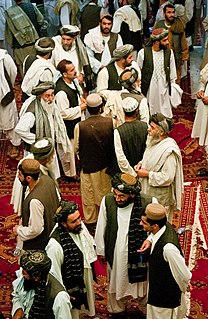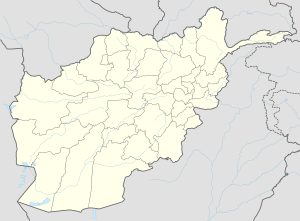
Afghanistan, officially the Islamic Republic of Afghanistan, is a landlocked country at the crossroads of Central and South Asia. Afghanistan is bordered by Pakistan to the east and south; Iran to the west; Turkmenistan, Uzbekistan, and Tajikistan to the north; and China to the northeast. Occupying 652,000 square kilometers (252,000 sq mi), it is a mountainous country with plains in the north and southwest. Kabul is the capital and largest city. The population is around 32 million, composed mostly of ethnic Pashtuns, Tajiks, Hazaras, and Uzbeks.

Kabul is the capital and largest city of Afghanistan, located in the eastern section of the country. It is also a municipality, forming part of the greater Kabul Province, and divided into 22 districts. According to estimates in 2020, the population of Kabul is 4.222 million, which includes all the major ethnic groups of Afghanistan. Afghanistan's only city with a population of over 1 million, Kabul serves as its political, cultural and economical center. Rapid urbanization has made Kabul the world's 75th largest city.

Kandahar or Qandahar is a city in Afghanistan, located in the south of the country on the Arghandab River, at an elevation of 1,010 m (3,310 ft). It is Afghanistan's second largest city after Kabul, with a population of about 614,118. It is the capital of Kandahar Province and also the center of the larger cultural region called Loy Kandahar. In 1709, Mirwais Hotak made the region an independent kingdom and turned Kandahar into the capital of the Hotak dynasty. In 1747, Ahmad Shah Durrani, founder of the Durrani dynasty, made Kandahar the capital of the Afghan Empire.

Operation Enduring Freedom (OEF) was the official name used by the U.S. government for the Global War on Terrorism. On 7 October 2001, in response to the September 11 attacks, President George W. Bush announced that airstrikes targeting Al Qaeda and the Taliban had begun in Afghanistan. Operation Enduring Freedom primarily refers to the War in Afghanistan, but it is also affiliated with counterterrorism operations in other countries, such as OEF-Philippines and OEF-Trans Sahara.

The Taliban or Taleban, who refer to themselves as the Islamic Emirate of Afghanistan (IEA), are a Sunni Islamic fundamentalist political movement and military organisation in Afghanistan currently waging war within that country. Since 2016, the Taliban's leader is Mawlawi Hibatullah Akhundzada.

Pashtuns, historically known as Afghans, are an Iranian ethnic group native to Central and South Asia.

The Soviet–Afghan War was a conflict wherein insurgent groups, as well as smaller Maoist groups, fought a nine-year guerrilla war against the Soviet Army and the Democratic Republic of Afghanistan government throughout the 1980s, mostly in the Afghan countryside. The mujahideen were variously backed primarily by the United States, Pakistan, Iran, Saudi Arabia, China, and the United Kingdom; the conflict was a Cold War-era proxy war. Between 562,000 and 2,000,000 civilians were killed and millions of Afghans fled the country as refugees, mostly to Pakistan and Iran.

Hamid Karzai is an Afghan politician who was the president of Afghanistan from 22 December 2001 to 29 September 2014. He is also the leader of the Popalzai Durrani tribe of Pashtuns.

Pashto, sometimes spelled Pukhto or Pakhto, is an Eastern Iranian language of the Indo-European family. It is known in Persian literature as Afghani.

The International Security Assistance Force (ISAF) was a NATO-led military mission in Afghanistan, established by the United Nations Security Council in December 2001 by Resolution 1386, as envisaged by the Bonn Agreement. Its main purpose was to train the Afghan National Security Forces (ANSF) and assist Afghanistan in rebuilding key government institutions, but was also engaged in the War in Afghanistan (2001–present) against the Taliban insurgency.

The Durand Line is the international 2,670 km (1,660 mi) land border between Afghanistan and Pakistan in South-Central Asia. It was originally established in 1893 as the international border between British India and Emirate of Afghanistan by Mortimer Durand, a British diplomat of the Indian Civil Service, and Abdur Rahman Khan, the Afghan Emir, to fix the limit of their respective spheres of influence and improve diplomatic relations and trade.

Ashraf Ghani Ahmadzai is an Afghan politician, academic, and economist who is serving as the President of Afghanistan. He was first elected on 20 September 2014 and was re-elected in the 28 September 2019 presidential election. He was announced the winner after a protracted process in February 2020 and was sworn in for a second term on 9 March 2020. An anthropologist by education, he previously served as Minister of Finance and the Chancellor of Kabul University.

Afghanistan is made up of 34 provinces. The provinces of Afghanistan are the primary administrative divisions. Each province encompasses a number of districts or usually over 1,000 villages.

The Second Anglo-Afghan War was a military conflict fought between the British Raj and the Emirate of Afghanistan from 1878 to 1880, when the latter was ruled by Sher Ali Khan of the Barakzai dynasty, the son of former Emir Dost Mohammad Khan. The war was part of the Great Game between the British and Russian empires.

The Afghanistan men's national team represent Afghanistan in international cricket. Cricket has been played in Afghanistan since the mid-19th century, but it was only early in the 21st century that the national team began to enjoy success. The Afghanistan Cricket Board was formed in 1995 and became an affiliate member of the International Cricket Council (ICC) in 2001 and a member of the Asian Cricket Council (ACC) in 2003. After nearly a decade of playing international cricket, on 22 June 2017, at an ICC meeting in London, full ICC Membership was granted to Afghanistan, taking the number of Test cricket playing nations to twelve. It is the first country to ever achieve Full Member status after holding Affiliate Membership of the ICC

The War in Afghanistan stems from the United States invasion of Afghanistan on 7 October 2001, when the United States of America and its allies successfully drove the Taliban from power in order to deny Al-Qaeda a safe base of operations in Afghanistan. Since the initial objectives were completed, a coalition of over 40 countries formed a security mission in the country called International Security Assistance Force, of which certain members were involved in military combat allied with Afghanistan's government. The war has afterwards mostly consisted of Taliban insurgents fighting against the Afghan Armed Forces and allied forces; the majority of ISAF/RS soldiers and personnel are American. The war is code named by the U.S. as Operation Enduring Freedom (2001–14) and Operation Freedom's Sentinel (2015–present); it is the longest war in U.S. history.

The Afghanistan conflict is a series of wars that has been fought in Afghanistan since 1978. Starting with the Saur Revolution military coup, an almost continuous series of armed conflicts has dominated and afflicted Afghanistan. The wars include:
The withdrawal of U.S. troops from Afghanistan describes the draw down of United States Armed Forces in the Afghanistan war and the plans after its post-2014 presence when most combat troops had left Afghanistan at the end of 2014.
Rashid Khan Arman, commonly known as Rashid Khan, is an Afghan cricketer and the current vice-captain of the national team. He was one of the eleven cricketers to play in Afghanistan's first ever Test match, against India, in June 2018. He returned the most expensive bowling figures by a debutant in a nation's maiden Test match. In September 2019, he led the team in the one-off Test against Bangladesh, and at the age of 20 years and 350 days, became the youngest cricketer to captain a Test match side.

The COVID-19 pandemic in Afghanistan is part of the worldwide pandemic of coronavirus disease 2019 caused by severe acute respiratory syndrome coronavirus 2. The virus was confirmed to have spread to Afghanistan when its index case, in Herat, was confirmed on 24 February 2020.



















